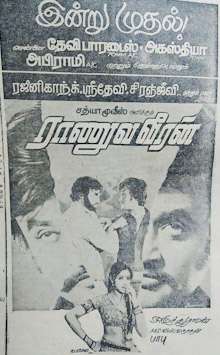Ranuva Veeran
Ranuva Veeran is a 1981 Tamil action drama film directed by S. P. Muthuraman, starring Rajinikanth and Sridevi in the lead roles. Chiranjeevi played the main antagonist. It was dubbed into Telugu as Bandipotu Simham and released on 21 May 1982,[1] and in Hindi as Zulm Ki Zanjeer.[2]
| Ranuva Veeran | |
|---|---|
 Film poster | |
| Tamil | ராணுவ வீரன் |
| Directed by | S. P. Muthuraman |
| Produced by | R. M. Veerappan and G. Thyagarajan |
| Written by | Vijay Krishnaraj (dialogues) |
| Screenplay by | Sathya Movies story department |
| Story by | Radha Veerannan, S. Jagadessan, Krishna, Thamizhagan |
| Starring |
|
| Music by | M. S. Viswanathan |
| Cinematography | Babu |
| Edited by | R. Vittal |
Production company | Sathya Movies |
| Distributed by | Sathya Movies |
Release date |
|
Running time | 152 minutes |
| Country | India |
| Language | Tamil |
Plot
The film opens with (Chiranjeevi) being chased and caught by a group of policemen, but he escapes. Meanwhile, a young military man (Rajinikanth) returns to his village, which is known for frequent thefts and murders perpetrated by the mysterious "One-Eyed Man" Chiranjeevi and his gang of thieves. Rajini soon meets Chiranjeevi; the two were once college roommates, but they had since separated. In addition to Chiranjeevi, Rajini reunites with his father (Poornam Vishwanathan), an Orthodox Iyengar who always condemns him, and he finds out that his sister eloped with a man few years before, which he later finds out was other than the gangleader of the thieves himself, Chiranjeevi. (Sridevi) plays Rajini's love interest as a poultry farm girl in a highly glamorous role. The climax fight between Rajini and Chiranjeevi is the highlight of the movie. In the end, Chiranjeevi gets shot by his own son.
Cast
- Rajinikanth as Raghu
- Chiranjeevi as Onti Kannu Viplavakarudu
- Sridevi
- Poornam Vishwanathan as Raghu's father
- Nalini
- J. Lalitha as Rajinikanth's sister
- K. Natraj
- Mafia Sasi
- G. Srinivasan
- MLA Thangaraj
- Parthiban in an uncredited role
Production
Producer R. M. Veerappan wrote this script keeping M. G. Ramachandran in mind but since he was involved with politics, Rajinikanth was chosen instead. Chiranjeevi, who went on to become a popular actor in Tollywood acted in a negative role.[3]
Soundtrack
Soundtrack was composed by M. S. Viswanathan and lyrics were written by Pulamaipithan [4][5][6]
- " Malligai Poo" - Malaysia Vasudevan, M. S. Viswanathan
- " Sonnalthane Puriyum" - S. P. Balasubrahmanyam, S. P. Sailaja
- "Vaarungal" - S. P. Balasubramanyam
References
- https://www.youtube.com/watch?v=DAldrzcQxJI
- https://www.youtube.com/watch?v=snmJlkO8SPI
- http://cinema.dinamalar.com/tamil-news/48146/cinema/Kollywood/flask-back-rajini-replaced-instreated-of-MGR-in-Ranuva-veeran-.htm
- http://www.rajinikanth.com/songs/ranuvaveerans.htm
- http://gaana.com/album/ranuva-veeran
- http://www.saavn.com/s/album/tamil/Ranuva-Veeran-1981/EF6-gMNxzZM_